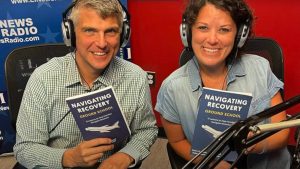
The Myth of Hitting Rock Bottom
One of the biggest blocks to seeking recovery can be the myth that someone has to “hit rock bottom” before they can recover from a drug habit.
Rock bottom is a fallacy. We all have a Hollywood version of it in our minds, an addict under a bridge with a brown paper bag. Not many people actually have that experience. Anyway, the person under the bridge may very well have made the decision to continue drinking, to stay away from recovery.
You can stop using anytime, even if you haven’t hit bottom
The decision to recover can come to someone at any time, whenever they’re ready for a new life. Whenever they are ready to be done with the sickness, the hangovers, and the consequences. Many young people have chosen recovery after just a few years of using.
I compare addiction to a speeding freight train. We are free to jump off at any point. Some people get off early, while the train is still accelerating, some wait until the train gets shaky and the wheels fall off, and some wait for the crash. But do they have to?
Not everyone makes it out alive
When someone chooses to recover, they’ve likely had some negative consequences from their use, and the longer they use the more consequences there are. People can choose recovery early, before the consequences really start to pile up.
“Hitting bottom” is an emotional experience. Someone hits bottom in their mind, with their feelings, in their heart and soul. It has nothing to do with what their life looks like from the outside.
For many addicts, their first bottom is just the beginning
A lot of people look like they’re really happy when they’re using, and often their friends are surprised that they’re even considering recovery. They may have an abundant life, houses, and a good job. On the inside, using is taking a huge emotional toll.
When I chose to get sober, my life looked very abundant. In fact, I decided to get sober in a vacation house in the Hamptons. Inside, however, I was emotionless and very unhappy. I never told anyone about my feelings.
People can choose recovery at any time, and we want to catch them before too many bad things have happened. They don’t need to wait until they “lose everything” to recover. In fact, many people don’t wait that long. I liken recovery to a self-help program that we choose for ourselves. We’ve all chosen workouts, medications, and diets for self-improvement. We consciously choose to adhere to those programs. Most people choose to diet, for instance, when they notice a few extra pounds long before they become obese.
You can choose recovery any time you want
You can choose recovery any time you want. Most people that question their substance use have already reached an emotional bottom, whether they’re expressing it to others or not. What others see, on the outside, may not reflect what you’re feeling on the inside.
Let’s bust the myth that someone has to hit “rock bottom.” Let’s help people chose recovery before they hit that point. By intervening early, we can tap into someone’s emotional bottom. They might already be there.
Our goal with an intervention is to help someone see the consequences of their substance use, to shine a light on something that they are missing. We want to help them choose recovery at a point before rock bottom.
About Adam Banks
Adam Banks is a certified interventionist and the owner of Adam Banks Recovery. After receiving an MBA from the University of Chicago, Adam built a company that was later acquired by United Health Care. His discipline and attention to detail comes from his former career as an airline pilot, holding an ATP, the FAA’s highest license.
Today, Adam is dedicated to helping others achieve long-term sobriety. His work has guided executives, pilots, and physicians on paths to recovery. Adam brings families together through a loving and inclusive approach.
Adam has authored four books on addiction. His recent work, Navigating Recovery Ground School: 12 Lessons to Help Families Navigate Recovery, educates families on the entire intervention process. He also offers a free video course for families considering an intervention for a loved one.
Adam is available for alcohol and drug intervention services in New York, Long Island, the Hamptons as well as nationally and internationally.




